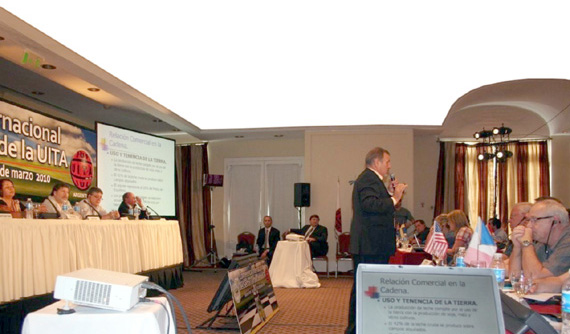Towards an IUF Global
Dairy Department
The
IUF Global Dairy Conference ended last Friday, March
12 after holding sessions in Buenos Aires and
Sunchales, with more than 120 participants from 22
countries.
On the second and last day of the Conference,
delegates from several European countries, including
Germany, Denmark, Spain,
France and Sweden, and from South
Africa presented a brief overview of the
situation of the dairy sector in their respective
countries, as well as of their trade unions.
These presentations revealed numerous points in
common and some differences with the previous day's
presentations by Latin American delegates. A
recurring theme was the constant difficulties that
many trade unions face with a number of companies,
in particular, the transnational corporation
Nestlé.
James
Ritchie, general secretary of the New
Zealand Dairy Workers Union (NZDWU),
then outlined the situation of dairy farmers and the
dairy industry in his country, and describe major
difficulties faced by the labor movement as a result
of a new wave of neoliberal measures implemented by
the current government. He highlighted, however,
that, with its membership of seven thousand workers,
NZDWU still enjoys a solid position.
"Dairy
production is crucial for the country, as milk and
dairy goods are its main exports,"
he noted, explaining one of the reasons why his
union has had relatively few problems. In addition,
Ritchie underlined the importance of
coordinating actions with other trade unions in the
dairy sector, highlighting NZDWU's excellent
relationship with the Argentine Association of Dairy
Industry Workers (ATILRA).
The conference continued with a presentation
entitled “Analysis of the Global Dairy Sector. A
View from MERCOSUR," in which Enildo
Iglesias, of the IUF’s Latin American
Regional Office, gave a summary of his report "The
Dairy Industry in the Southern Cone from a Trade
Union Perspective,"
one of the background papers used in the conference.
Iglesias
noted that it was still a preliminary report, as the
idea was for it to be modified and expanded in the
conference with contributions from participants. In
his presentation, besides providing valuable figures
and quantitative data from the sub-region, he noted
that
the
leading problems faced by MERCOSUR countries are the
increasing concentration and foreign ownership of
land, which is an essential resource for milk
production.
Iglesias
also stressed the need to examine the activity's
high consumption of water, in view of the current
global water crisis that is growing increasingly
worse.
He also pointed to growing consumer concern about
animal welfare and their rejection of certain
production practices and ways in which animals are
raised. He said that several countries of the
region are using a bovine hormone sold by Monsanto
to increase cow productivity and warned that this
poses great risks for animal and human health.
Lastly, he described the situation of the labor
movement in dairy production and industry, and
presented a number of proposals for future work.
Iglesias
was followed by National Dairy Undersecretary
Arturo Jorge Videla who stressed
that the government has a strong interest in the
sector and is heavily supporting it. In this sense,
he said that the government has prepared a draft
Dairy Program that sets out three national goals and
defines responsibilities, rights and obligations for
the sector's various stakeholders, establishing
clear political criteria resulting from discussions,
exchanges and agreements.
The draft Dairy Program itself was presented by
Roberto Socin, regional director of
Strategic Sectorial Planning, who is also a dairy
producer.
The conference closed with words by IUF
secretary general Ron Oswald, who
congratulated the organizers, in particular
ATILRA, saying that this event was the
realization of a long-held aspiration.
The Spanish delegation took the opportunity to call
for the creation of a
Global
Dairy Department within the IUF,
a proposal that was seconded by several other
delegations. Oswald expressed his support for
the initiative and announced that he would put it to
the consideration of the IUF’s International
Executive Committee. He also invited ATILRA
general secretary Héctor Ponce to
present the proposal himself at an upcoming meeting
of the committee, and the Argentine unionist
accepted the invitation.
Ron
Oswald noted that creating such a department
will only be possible if the affiliate organizations
commit to that responsibility, and said he was fully
confident that they would.
On the last two days of the conference, many of the
foreign delegations traveled to the city of
Sunchales, in the province of Santa Fe, where
they visited youth training centers and several
facilities, including the National Agricultural
Research Institute (INTA), a Sancor
cooperative plant, and, naturally, the headquarters
of ATILRA, where they were impressed by the
first-rate infrastructure at the trade union's
clinic,
Clínica 10 de Septiembre,
which provides integral health services for the
region's workers.
